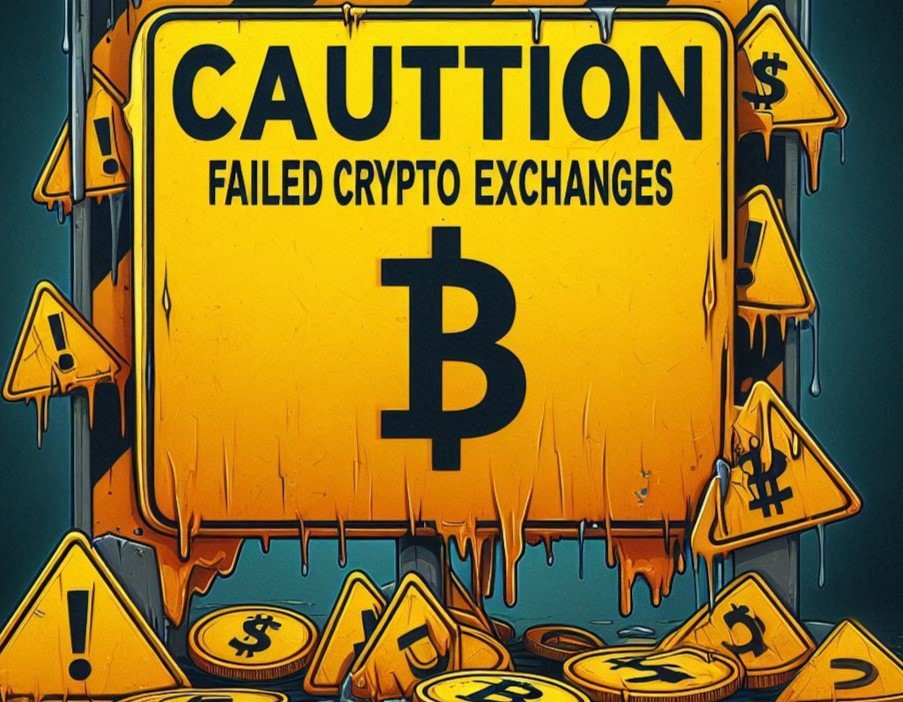As we discuss the top 10 failed crypto exchanges, you will discover the typical challenges that can cause even the most promising crypto exchanges to shut down.
Here, we shed light on failed cryptocurrency exchanges and provide information to help you better secure your investments in an ever-changing crypto world. Let us jump into what crypto exchanges are and the various types of crypto exchanges.
What Are Crypto Exchanges?
Crypto exchanges are digital platforms where users can purchase, sell, and trade various cryptocurrencies. They facilitate the buying and selling of digital assets like Bitcoin, Ethereum, and other digital currencies that can be exchanged for other digital currencies or traditional fiat money (like USD, EUR, or JPY).
Types of Crypto Exchanges
Centralized Crypto Exchanges (CEX):
The most popular kind of crypto exchange is centralized exchange, in which a third party oversees the transactions and is called the exchange operator.
Binance, Coinbase, and Kraken are a few examples. These platforms provide a wide range of trading pairs, great liquidity, and an easy-to-use interface. However, they are also targets for hackers since they store user money.
Decentralized Crypto Exchanges (DEX):
Decentralized crypto exchanges use blockchain technology to enable peer-to-peer trade in place of a central authority. DEXs include platforms such as PancakeSwap and Uniswap.
Because users maintain control of their private keys, these exchanges provide increased security and privacy. Nevertheless, they might be more difficult to utilize and usually have less liquidity.
It’s easier to understand how vital the “TOP 10 Failed Crypto Exchanges” are when you know how important crypto exchanges are to the digital economy.
The Importance of Crypto Exchanges in the Digital Economy
Crypto exchanges are the backbone of the digital economy. They let millions of people buy, sell, and invest in cryptos. These platforms make it easier to buy, sell, and trade digital assets.
For example, users can trade crypto for other digital currencies or regular money. The crypto market is very flexible and easy to get into. Without crypto exchanges, these features would not be possible, slowing the growth and use of digital currencies.
Here are some of the importance of crypto exchanges in the digital economy:
- Liquidity and Market Efficiency: One of the most important things that crypto platforms do is provide liquidity, which is needed for a market to be healthy. Liquidity makes sure that things can be bought and sold quickly without causing big changes in price. Crypto exchanges bring buyers and sellers together. This helps keep prices fixed and speeds up trade. Trust in the market increases, meaning more people join and invest in the crypto space.
- Value Discovery and Market Transparency: Exchanges are very important to price setting, which is how the market figures out how much an asset is worth by watching how supply and demand change. The prices shown on crypto exchanges are based on the most recent market conditions. This gives traders and buyers complete information. This transparency is very important for boosting trust in the market because it lets people use real-time data to make smart choices.
- Accessibility and Global Reach: Crypto exchanges are one of a kind because they can connect users from all over the world. This breaks down geographical obstacles that have traditionally made it hard for people to get financial services. Crypto markets are a lifeline for people in places where banking systems aren’t very good because they let them join the global economy. Making finance more reachable to everyone is among the most significant things crypto platforms have done for the digital economy. This empowers individuals all over to determine their own financial future.
- Innovation and Growth of Financial Services: Many crypto exchanges give a lot of different financial services besides just trading, which helps the digital economy grow. Some are loans, staking, margin trading, and even derivatives. By offering these services, platforms not only get more users but also encourage new ideas in the financial sector. This makes it harder to tell the difference between traditional finance and the new digital economy.
Vulnerability Factors:
However, the fact that crypto platforms are so important also makes them more vulnerable. Centralization, liquidity, and ease are some of the things that make exchanges so important, but they also make them vulnerable to big risks. It is easy for hackers to get into centralized platforms because they hold so many digital assets.
The rules governing crypto exchanges are still evolving, so there could be regulatory challenges that shut them down or limit their operations. It is well known that the crypto market is uncertain, which can be very hard on platforms and lead to failed crypto exchanges.
There are different criteria for identifying failed crypto exchanges.
Criteria for Identifying Failed Crypto Exchanges
When discussing failed crypto exchanges, it’s essential to understand what entails “failure” in this context. Failed crypto exchanges usually fall into one of several categories:
Insolvency (Bankruptcy):
Insolvency results from crypto exchanges’ inability to fulfill their financial obligations, frequently due to inadequate liquidity or mismanagement of funds. This often results in the freezing of user accounts, the inability to process withdrawals, and, eventually, failed crypto exchanges.
Regulatory Shutdowns:
Regulatory shutdowns occur when government authorities intervene due to the exchange’s noncompliance with local laws, allegations of unlawful activities (such as money laundering), or failure to obtain appropriate licensing. Users may be deprived of their funds due to these sudden shutdowns.
Outright Scams:
Some crypto exchanges are established with fraudulent intentions to deceive users and steal their assets. These scams, frequently camouflaged as legitimate platforms, often culminate in “exit scams,” in which the operators abruptly vanish with their users’ funds, leaving no trace.
Impact of Failed Crypto Exchanges on the Market:
Failed crypto exchanges can significantly impact the broader market:
Investor Losses:
The inability of thousands, if not millions, of users to access their assets is frequently the result of failed crypto exchanges. These losses can be catastrophic, particularly when the crypto exchanges maintain substantial cryptocurrency reserves.
Failed crypto exchanges can result in the loss of individual savings, the erosion of investor trust, and the escalation of broader market volatility.
Market Confidence:
The failure of a prominent crypto exchange can undermine the confidence of the entire crypto market. Users may become hesitant to invest in cryptocurrencies altogether if they lose trust in the cryptocurrency exchanges facilitating trading.
This lack of confidence can result in a general decline in market sentiment, reduced trading volumes, and decreased market activity.
Consequences for Other Exchanges:
Occasionally, the failure of a single crypto exchange can result in a domino effect, in which other crypto exchanges are forced to deal with heightened withdrawal demands from frightened users, which can contribute to liquidity issues and potential failures. Everything is linked to each other, which shows that the crypto sector has systemic risks.
Now that you understand the different criteria for identifying failed crypto exchanges let us discuss the top 10 failed crypto exchanges.
TOP 10 Failed Crypto Exchanges
The table below discusses the top 10 failed crypto exchanges in no particular order, highlighting the reason for the most notable failures, their impact on the market, and the key insights for investors and the industry.
| Rank | Crypto Exchange | Year of Failure | Reason for Failure | Impact on Market | Key Points |
| 1 | Mt. Gox | 2014 | Hack leading to loss of 850,000 BTC | Massive loss of user funds, shaken confidence in crypto exchanges | Importance of security, transparency, and regulation |
| 2 | Cryptopia | 2019 | Security breach, hack | Loss of funds led to liquidation | Need for robust security measures |
| 3 | QuadrigaCX | 2019 | Founder’s death, lost access to funds | Investors lost millions, and legal battles ensued | Importance of decentralization, fund access |
| 4 | BTC-e | 2017 | Regulatory shutdown, money laundering | Seizure of funds, significant market disruption | Compliance with regulations |
| 5 | Bitfinex | 2016 | Hack resulting in loss of 120,000 BTC | Temporary market dip, user compensation via token issuance | Security protocols, incident response |
| 6 | MapleChange | 2018 | Alleged hack, exit scam | Users lost all funds, and the exchange vanished | Caution against scams, due diligence |
| 7 | Coincheck | 2018 | Hack of NEM tokens, $530M lost | Major losses led to increased regulation in Japan | Security in storing digital assets |
| 8 | BitGrail | 2018 | Hack, loss of 17 million Nano (XRB) | Investors lost funds, and the exchange blamed developers | Risk of centralized exchanges |
| 9 | FTX | 2022 | Mismanagement of funds, Lack of transparency, Regulatory gaps, and lack of proper oversight, deposits due to liquidity concerns | Drop in crypto prices (Bitcoin, Ethereum), heightened regulatory scrutiny on crypto exchange, bankruptcies, Erosion of trust in centralized exchanges | Importance of financial transparency and oversight, Shift of investor preference towards decentralized platforms (DeFi), Legal consequences for FTX executives |
| 10 | Altsbit | 2020 | Hack, loss of multiple cryptocurrencies | Closure following the loss of user funds | Importance of exchange security, user caution |
FTX

Bitfinex

Altsbit

Mt. Gox

Now that we have discussed the top failed crypto exchanges, what are the common themes associated with the exchanges’ failures?
Common Themes in Crypto Exchange Failures
Here, we effectively highlight the recurring issues that have led to the downfall of numerous failed crypto exchanges, providing you with a comprehensive understanding of the risks involved in the crypto trading landscape.
Security Breach:
A significant number of failed crypto exchanges were ultimately brought down by security breaches. Due to the decentralized nature of cryptocurrencies and their substantial value, crypto exchanges are prime targets for hackers.
Inadequate security measures, including the absence of multi-signature wallets, inadequate encryption protocols, and inadequate user authentication processes, have consistently been demonstrated to be fatal vulnerabilities.
Some notable examples include:
- The 2014 hack at Mt. Gox, which lost 850,000 Bitcoins, equivalent to hundreds of millions of dollars, is the most infamous example of failed crypto exchanges. The crypto exchange’s inadequate security protocols and lack of transparency were the primary factors contributing to this catastrophic breach.
- Cryptopia is another exchange that hackers compromised, resulting in a substantial loss of user funds and the platform’s liquidation in 2019.
These events show how important strong security measures are for keeping user assets safe. These include cold storage solutions, regular security checks, and advanced encryption technologies.
Regulatory Challenges:
Another common reason for many failed crypto exchanges is that regulators closely watch them. As rules about cryptocurrencies change around the world, legal problems have occurred, and, in some cases, crypto exchanges have completely shut down.
Some notable examples include:
- For BTC-e, the exchange was shut down in 2017 after the US government cracked down on it on money laundering charges. It was shut down for not following international rules and was involved in illegal activities.
- QuadrigaCX: The crypto exchange was under a lot of regulatory pressure, especially after its founder’s sudden and mysterious death, which showed that funds were not being appropriately managed and there wasn’t enough regulatory control.
Regulatory challenges highlight the need for crypto exchanges to follow national and international legal frameworks. Crypto exchanges must adjust to prevent possible shutdowns as governments impose stricter restrictions, particularly about know-your-customer (KYC) and anti-money laundering (AML) procedures.
Misconduct and Bad Management:
Several failed crypto exchanges result from bad management, fraud, and other bad behavior. Some crypto exchanges have gone down because the management team was negligent or engaged in outright fraudulent activities.
Some notable examples include:
- QuadrigaCX: When the crypto exchange’s founder, Gerald Cotten, died, it was found that he had full access to the wallets and secret keys. This meant that about $190 million in user funds were lost. To make things worse, there wasn’t enough transparency and proper fund management.
- BitGrail: The founder was accused of misusing user funds and not keeping the crypto exchange safe enough, which caused 17 million Nano coins to be lost and the exchange to shut down.
Before going into crypto investments, you should know several things/lessons.
Lessons for Investors
This article also equips investors with practical advice on safeguarding their investments in the often turbulent world of cryptocurrency trading. By emphasizing due diligence, security, and diversification, investors can better navigate the risks of trading on crypto exchanges.
Due Diligence: Investors need to know how important it is to study any crypto exchange before putting money into it. The history of failed crypto exchanges that went out of business is a stark reminder that not every site is the same. It’s important to do the following before making any deposits:
- Check out the Exchange’s Reputation: Read user reviews, industry reports, and any news stories about problems faced by the exchange in the past. If a crypto exchange has a past of security breaches or bad customer service, you should be wary of it.
- Know the Regulatory Status: Make sure that the trade follows the laws in the place where it is located. Crypto exchanges that follow rules about know-your-customer (KYC) and anti-money laundering (AML) are usually more reliable.
- Examine the Management Team: Find out more about the people who run the exchange. A team with a lot of knowledge and experience is less likely to waste money or commit scams.
Investors who do their research are better able to escape the problems that users of failed crypto exchanges have run into.
Security Awareness: Investors should give priority to platforms with robust security measures, as failed crypto exchanges frequently fall as a result of security breaches. Important security considerations are as follows:
- Chilled Storage: Exchanges that keep most of their users’ money in cold wallets—offline—are less susceptible to cyberattacks. One important component that greatly lowers the chance of loss from cyberattacks is cold storage.
- Multi-Signature Wallets: These wallets make it more difficult for hackers to access funds without authorization by requiring numerous private keys to approve a transaction. Make sure this technology is used by the exchange you select.
- Frequent Security Audits: Exchanges with strong defenses against cyberattacks are more likely to be subject to regular, independent security audits. These audits assist in locating weaknesses and fixing them before an attack may take advantage of them.
Investors can drastically lower their chance of losing their funds to cyberattacks or other cybercrimes by placing a high priority on security.
Diversification: this is one of the most important tactics to reduce the likelihood of encountering failed crypto exchanges. Diversification is important when deciding where to hold and trade your assets, just as it is when creating a well-balanced financial portfolio.
- Spread Investments Across Multiple Crypto Exchanges: You should think about splitting up your assets among several reliable exchanges rather than depending only on one. This strategy makes sure that your money isn’t entirely at risk in one location and lessens the impact of a failed crypto exchange.
- Use Hardware Wallets: Hardware wallets are a good option for long-term cryptocurrency storage. Because they provide the highest level of protection, these offline devices are immune to online risks. To minimize crypto exchange-related risks, you might further allocate a portion of your funds to a hardware wallet.
- Monitor Market Conditions: Maintain awareness of the regulatory environment and market trends that may impact the stability of exchanges. It is essential to be proactive and adapt your strategy in response to emergent risks in order to safeguard your investments.
Conclusion
Even the most established exchanges are susceptible to failure due to the volatile nature of the cryptocurrency market. The risks inherent in the industry and the need for investors to remain vigilant are underscored by these TOP 10 Failed Crypto Exchanges.
The potential for substantial losses is perpetually present despite the allure of high returns.
